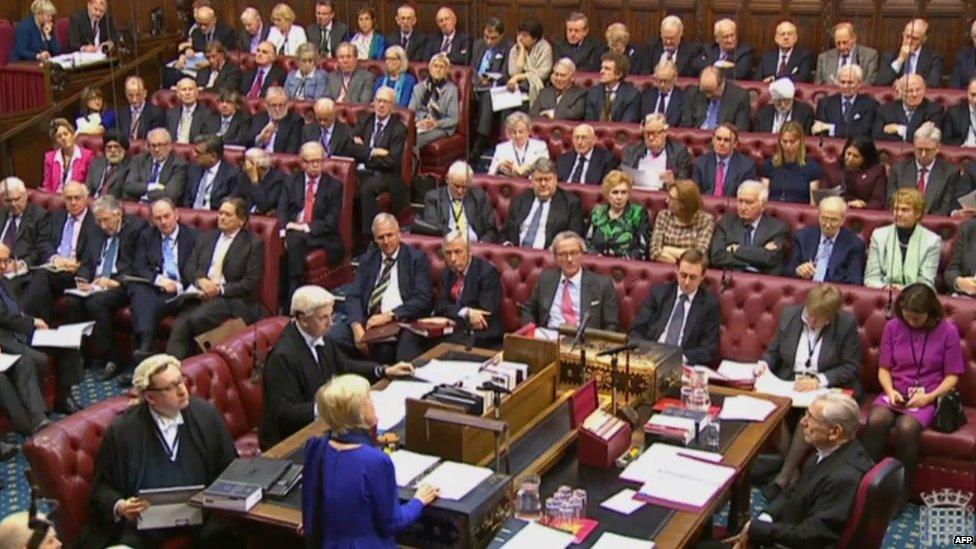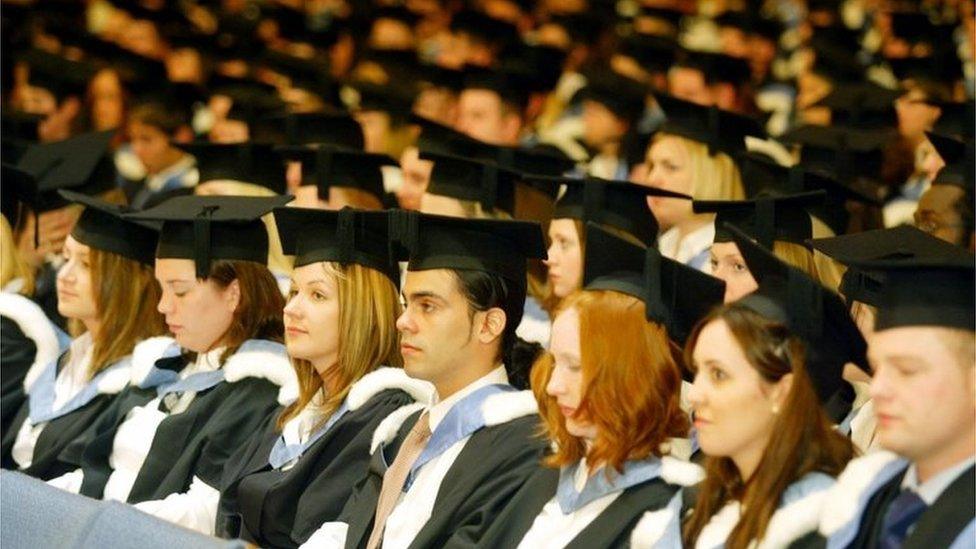Week ahead in Parliament
- Published
- comments

The Lords will continue to sit next week - and there's plenty of Brexit-related business to deal with
MPs have already begun their Easter break - but the Lords legislate on.
Mostly they're sweeping up some legislative fag-ends, but the Tuesday debates on the process of Brexit could provide some significant action, as the Labour Lords ("the effective wing of the party," one peer murmured to me) seek to keep up pressure on the government on two long term issues where they are seen as being vulnerable.
And watch out for the publication of the Commons Brexit Committee's latest report, which has, even before publication, produced a damaging squabble between Leave and Remain Committee members. (Incidentally someone asked in comments on my earlier post on this, how the committee members are chosen - they are elected from within each party group.)
MPs are back in the Commons on Tuesday 18 April, and peers will return on Monday 24 April.
Here's my rundown of the week ahead:
Monday
The Lords meet at 2.30pm - when questions to ministers will include Labour's Lord Brooke of Alverthorpe raising the display and promotion of alcohol in supermarkets and the danger to the health and well-being of children.
The day's main debates are on internal issues. First up, there will be a motion to approve plans for the next Parliamentary year's crop of special select committees to conduct one-off inquiries.
The chosen subjects are: the economic, ethical and social implications of advances in artificial intelligence; citizenship and civic engagement; the effects of political polling and digital media on politics, and finally, a post-legislative scrutiny committee on the impact of the Natural Environment and Rural Communities Act 2006.
This last one will look at how effective the Act has been in its purposes of conserving biodiversity, promoting open spaces and open-air recreation, and meeting rural needs.
Normally this kind of inquiry has been aimed at examining how highly technical measures are playing out, but this one will focus more on how public policy is unfolding. All four committees will be instructed to report by the end of March 2018.
After that, peers will vote on a report from their Privileges and Conduct Select Committee recommending some changes, external to the rules for declarations of interests for peers with "significant control of a company".
This proposes a number of tweaks to the wording - so financial and non-financial interests would have to be declared if a reasonable member of the public might think a peer would (rather than "might") be be influenced by them.
Finally peers will have their second committee stage debate on the detail of the Criminal Finances Bill,, external which deals with terrorist property, creates corporate offences on tax evasion and money laundering.
At this stage of debate, peers rarely force issues to a vote, but they will probe the government on issues like creating registers of beneficial ownership of companies in the UK's Overseas Territories and Crown Dependencies, a wider definition of "economic crime" and there's an interesting looking Labour amendment which would create a "corporate probation order" under which companies convicted of offences under the Act would be placed under supervision.
And another amendment would allow the courts to disqualify directors of companies convicted of offences.
Finally, there will be a short debate on progress made in combating neglected tropical diseases.
Tuesday
Even while MPs are away, reports from Commons committees are still emerging - watch out for the Brexit Committee's latest report, external, looking at the white paper setting out the government's negotiating objectives for exiting the EU.
This is the report which saw pro-Leave MPs walking out in protest at what they regarded as an unduly gloomy assessment of the UK's position.

Higher education will be one of the crunch topics in the Lords this week
When the Lords convene (2.30pm) there's a question from Lord Naseby on the clarity of dialogue in UK TV programmes.
Then peers will deal with some legislative loose ends - dealing with Commons amendments to the National Citizen Service Bill, external and the Children and Social Work Bill, external, and the third readings of the Technical and Further Education Bill, external and the Higher Education Bill, external - here the key issue is age statistics for HE institutions.
But the big event of the day will be two Brexit-related motions from Labour, intended to keep the pot boiling on two key issues.
First, Labour's Brexit spokespeer, Baroness Hayter of Kentish Town, will call for the government to produce a report on the progress made towards ensuring that qualifying non-UK European Economic Area nationals and their family members are able to retain their fundamental EU-derived rights after the UK has left the EU.
The report would be required by the end of the current Parliamentary session, which is expected to fall in mid-May.
Then Labour's leader, Baroness Smith of Basildon will call for the setting up of a Joint Committee of peers and MPs to report on how the promised "meaningful vote" in Parliament on the final divorce deal would actually work.
That report would be due by 31 October. Given that most peers tend to believe there is no earthly problem that cannot be resolved by a high-powered committee chaired by a senior ex-mandarin, this stands a good chance of being voted through.
The snag is that there is no requirement for the proposal to be put to the Commons, so any Lords message calling for the committee to be created could be left to "lie on the table" by the government.
But a smart Commons guerrilla might be able to force a debate on the idea - if Labour decide to put it to the House on an Opposition Day, or if they put a properly worded motion is put before the Backbench Business Committee. With most of the really experienced Commons insurgents on the pro-Brexit side of the House, this will be an interesting test of the new Remainer rebels.
Wednesday
A couple more interesting select committee reports are due: Science and Technology report on science in emergencies: chemical, biological, radiological or nuclear incidents, and the Joint Committee on Human Rights report on Human Rights and Business - and how the government can encourage and enforce human rights best practice for businesses in the UK and abroad.
The Lords meets at 3pm - where the much-amended Digital Economy Bill, external, which has seen the government lose seven separate votes on assorted amendments, is due for its third reading - there are some government amendments down on the order paper, but these don't look controversial, so the issue now is whether MPs will seek to overturn the changes made by Their Lordships, when the bill returns to the Commons.
Finally there's a Labour regret motion against the Higher Education (Basic Amount) (England) Regulations 2016 and Higher Education (Higher Amount) (England) Regulations 2016 - which set variable limits on the maximum fees that publicly funded higher education institutions can charge students.
The tuition fee cap for institutions that have achieved a Teaching Excellence Framework rating of "Meets Expectations" will be £9,250 for full-time courses in 2017-18 where the higher amount is permitted. One of the issues around this increase is evidence suggesting students from ethnic minorities, less advantaged backgrounds and mature students are more debt averse and cost sensitive than others.
Thursday
Watch out for two more select committee reports - European Scrutiny, external on Brexit and the European Scrutiny System in the House of Commons, which looks at how the Commons current system for considering EU legislation may need to be reshaped.
And the Justice Committee publishes its report on governor empowerment and prison performance - part of its major inquiry into the government's prison reforms.
The Lords meet at 11am, where questions to ministers include the Lib Dem Lord Sharkey on curbing the use of tax havens.
Then peers debate select committee report on Brexit and the EU budget, external which says that "the UK will not be strictly obliged, as a matter of law, to render any payments at all after leaving".
There will also be second reading debates on four Commons private members bills: the Local Audit (Public Access to Documents) Bill; the Merchant Shipping (Homosexual Conduct) Bill; the Guardianship (Missing Persons) Bill; and the Farriers (Registration) Bill.
None of them are controversial.